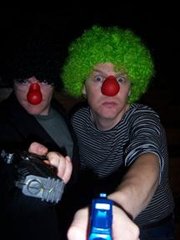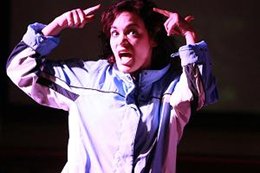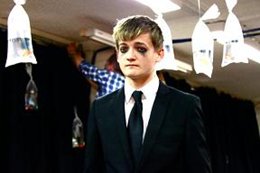The inaugural Galway Fringe Festival boasted over thirty theatre performances (including ten student productions), twelve dance shows, an exhibition featuring the work of over fifty artists, as well as a selection of rehearsed readings, cabaret, comedy, music gigs and workshops. Conceived by festival director, Claire Keegan, this open-access event served to complement the concurrent Galway Arts Festival by providing new and emerging artists the opportunity to showcase their work at the height of the busy tourist season.
Keegan, who has a longstanding background in theatre, worked for years at the Edinburgh Fringe. Armed with this experience, she decided to bring under one banner smaller arts events that take place regularly in Galway, as well as attracting new creative work. In doing so, Keegan aimed to revitalise a sense of community which she saw as intrinsic to the Galway arts scene when she worked with such companies as Punchbag Theatre during the ’90s.
The festival kindled a palpable buzz and a sense of team spirit around the city. The members of Truman Town Theatre worked as hard as ever to promote their restaging of Velvet Revolution—taking to the streets and local venues with full colour fliers. New performers such as Tom Walsh, whose partly-improvised spoof book talk You Only Get What You Give wittily pokes fun at the popular philosophy genre, enlisted the help of local company Side-Show to promote his comic creation. Downhill Sprint Theatre and Come As Soon As Soon You Hear also demonstrated commitment and enthusiasm in drawing in audiences.
Certain one-man shows such as You Only Get What You Give and Andrew Carney’s Craic-ow! were brave and showed potential, but were in need of some polishing. Due to its subject matter and its improvised elements, You Only Get What You Give would have been stronger in a fuller house; it might have been better to schedule less shows, in the hope of attracting larger groups to those taking place. A director could help Carney to add depth his piece, Craic-ow!, which was more like an entertaining pub story about a lads’ weekend abroad. Meanwhile, productions such as Wildebeest’s Tan and NUI Dramsoc’s Rough refreshingly offered insights into women’s socialising/drinking rituals. Both Craic-ow! and Duked Productions’ modernised version of The Importance of Being Earnest could have delved further into the performance of contemporary masculinity, which was stunningly achieved in Pennyroyal. Unfortunately, Duked focused instead on gaining cheap laughs from Algernon’s Tai Chi moves and Gwendolen straddling Jack.
Many of the theatre performances did not receive the full houses desired. Yet, well-attended or not, plenty of the theatre on offer deserves recognition for originality and artistic merit, including Come As Soon As You Hear’s Spurt and the return of Fregoli’s Breathing Water. Here are some of the festival highlights.
Safe
Sukitheatre
Monroe’s Tavern
Reviewed 18 July, 2012
Ciaran Coogan’s two-hander of the punning title Safe is a hilarious tale of two hapless, small-time criminals from Dublin. The action begins in a narrative style, with Jimmy (Colum Coogan) telling the audience about his gambling. Because, as he explains, “the less you have the more you want,” his debt to Micky Finn’s bookies has reached four grand. Micky wants his cash, and the optimistic Jimmy knows just how to get it. He plans to rob Micky’s betting shop, expecting that the loot will be enough to repay Micky and to escape to a better life. He calls in a favour from his friend Bren (Ciaran Coogan), who left him to take the fall for an earlier ill-planned crime. They start to plot a strategy which Jimmy believes is both clever and ‘safe’; and so begins our ludicrous adventure on a bus across Dublin.
 The drama is filled with vivid descriptions, and writer Ciaran Coogan hones the playful poetry of the Northside vernacular. Peppered with anecdotes and urban myths, the comedy of the piece lies in the way that it becomes cumulatively more convoluted—and more ridiculous. The writing generates suspense, even as it humorously riffs on famous films from the gangster and crime genres; one of the comic highlights is an Ocean’s Eleven-style schedule for the hold-up. An assortment of colourful characters is also brought to life through Bren and Jimmy’s stories.
The drama is filled with vivid descriptions, and writer Ciaran Coogan hones the playful poetry of the Northside vernacular. Peppered with anecdotes and urban myths, the comedy of the piece lies in the way that it becomes cumulatively more convoluted—and more ridiculous. The writing generates suspense, even as it humorously riffs on famous films from the gangster and crime genres; one of the comic highlights is an Ocean’s Eleven-style schedule for the hold-up. An assortment of colourful characters is also brought to life through Bren and Jimmy’s stories.
Colum and Ciaran embodied their roles with ease: as Bren, Ciaran was the perfect sidekick to Colum’s would-be mastermind, Jimmy. The two had little to work with beyond two water pistols, a safe, clown wigs and red noses. Yet, the minimalism of the set and props served only to add to the unpretentious comedy of the piece. Moreover, the two actors enthralled viewers through gesture, movement and energetic delivery. Safe worked exactly as lunchtime theatre should by offering a light-hearted and highly entertaining break from the mundane.
Pennyroyal
Downhill Sprint Theatre
The Cellar Bar, Galway
Reviewed 19 July, 2012
The take on love in Eamonn Hearns’ one-man show is, at times, cynical. Yet, as oxymoronic as it sounds, the darkness of the piece is both illuminating and exhilarating. Refreshingly candid and beautifully written, Pennyroyal tells the story of James’ romance with Laura, from its seemingly magical genesis to its bitter demise. The play examines such issues as the pressures of contemporary relationships, the performance of masculinity, and the role of our parents in how we construct our identities.
The action opens on James (Eamonn Hearns), who has a date tonight. He muses on the prospect of sexual intercourse, and the social value of online networking sites such as Facebook and Plentyoffish. Then we hear of his previous exploits, his romantic history, and Laura, the one that got away.
The set appeared like a cosy urban apartment arranged to entertain, small tables laid with wine glasses, cups and teapots. The space seemed organised to make audience members feel like they were on a date with James, with the red, curtained back-drop and the intimacy of the venue adding to this sense. The play’s content—though humorous—is often stark, but Hearns’ delivery was chatty and natural. He even poured tea for the viewers: a taster of the pivotal significance that tea-making rituals would take on later in the drama.
 This is a work that centres on performance and ritual, and, from the very beginning, Hearns makes us aware of the immense gap between the public and private James. When Laura complains that James never does anything nice for her—like make tea—he responds by becoming a tea expert. Yet, his outward attentiveness often serves to stifle an inner scream. As the tension builds, the writing and performance style become more innovative, with Hearns making good use of repetition and sound to highlight the strangeness of the mundane. He also repeats earlier material with revisions to reveal further aspects of the plot. Music, chosen by Hearns, added to the ambiance of the piece, with Nirvana’s ‘Pennyroyal Tea’ aptly playing out the production.
This is a work that centres on performance and ritual, and, from the very beginning, Hearns makes us aware of the immense gap between the public and private James. When Laura complains that James never does anything nice for her—like make tea—he responds by becoming a tea expert. Yet, his outward attentiveness often serves to stifle an inner scream. As the tension builds, the writing and performance style become more innovative, with Hearns making good use of repetition and sound to highlight the strangeness of the mundane. He also repeats earlier material with revisions to reveal further aspects of the plot. Music, chosen by Hearns, added to the ambiance of the piece, with Nirvana’s ‘Pennyroyal Tea’ aptly playing out the production.
Hearns’ play sheds light on the roles that contemporary men play in order to get what they think they want. Yet, through writing that blends immediate, familiar references with rich description and imagery, the play reveals that many confuse their own needs with social expectations. James slowly realises, however, that perhaps the delusion of happiness really is happiness. By promoting such complex enquiry, Pennyroyal gave lunchtime audiences at the Cellar Bar plenty to chew on.
For Penguin’s Sake
Jasango Theatre
Busker Browns (The Hall), Galway
Reviewed 26 July, 2012
Angela Ryan’s latest play, For Penguin’s Sake is a one-woman show concerning Grace (Lisa Daly), a young American scholar searching for her estranged mother in Ireland while she runs from the problems she has helped to create for herself at home.
The church-like top floor of Busker Browns worked as a striking theatre space and was put to fitting use by set designer Michael Lavelle Schofield. The play’s action takes place in an Irish shed: while seeking accommodation, Grace has been duped into signing up for “a taste of the life of a seventeenth-century stowaway.” The scent and hazy, atmospheric illumination of candles engulfed the venue, with images of lit candles also projected on a screen behind the stage area. The set was appropriately scattered with sawdust, canvas bags, suitcases and sparse antique furnishings. Music and sound by Mike Krisukas evoked blustery weather outside and raindrops on a galvanised roof; it also contributed to the ambiance throughout. For Penguin’s Sake offered truly sense-tickling theatre, with the production’s central action bookended by subtle surprises.
 The monologue is voiced by the well-drawn character of Grace, who tells of how she threw herself into academic achievement to escape a strained relationship with her father. As she prepared for a research project on the conservation of penguins, which would involve spending several years on Petermann Island in the Antarctic, she realised how much she had missed out on as a modern woman. She decided “like the Irish [with alcohol] on Good Friday,” to “stock up” on sexual experience. Her efforts to cram too much into her life inevitably led to crisis, to repressed traumas catching up with her and to the situation that the play concerns. Under George B. Miller’s direction, Lisa Daly evoked audience empathy as Grace, shifting naturally between the humour and pathos of the script.
The monologue is voiced by the well-drawn character of Grace, who tells of how she threw herself into academic achievement to escape a strained relationship with her father. As she prepared for a research project on the conservation of penguins, which would involve spending several years on Petermann Island in the Antarctic, she realised how much she had missed out on as a modern woman. She decided “like the Irish [with alcohol] on Good Friday,” to “stock up” on sexual experience. Her efforts to cram too much into her life inevitably led to crisis, to repressed traumas catching up with her and to the situation that the play concerns. Under George B. Miller’s direction, Lisa Daly evoked audience empathy as Grace, shifting naturally between the humour and pathos of the script.
If you’ve seen the animated film Happy Feet, you’ll know that the male penguin incubates the egg while the female leaves for the winter in search of food. As For Penguin’s Sake explores Grace’s failure to come to terms with her own mother’s departure, the writing draws interesting analogies between penguin and human parenting, and between parenting and academic research. It explores the enduring responsibilities of contemporary parenthood despite changes in family models, and asks if modern women really can have it all. Yet, For Penguins Sake provides no definitive answers. A simple yet aesthetically impressive production, it left audience members with much to ponder.
Spurt
Come As Soon As You Hear Theatre
The Townhouse Bar, Galway
Reviewed 28 July, 2012
The inventive charm of Come As Soon As You Hear’s Spurt gained a positive response from critics when it premiered at the 2011 Cork Summer Solstice Festival. The work was devised by the original cast, who used Jonathon Fox’s playback method to transform into theatre remembered experiences, with scripted elements by Karl Watson. Performed by Watson alongside a new team of actors for the inaugural Galway Fringe Festival, the work was immensely powerful, promoting simultaneously emotional response and sociocultural enquiry.
Spurt incorporates live goldfish; in Galway, they fluttered in bags of water suspended from the ceiling—some hanging directly over or beside audience members’ heads. This might seem like a publicity stunt; however, it harmonises effectively with the play’s themes and subject. The cast portrayed different versions of Finn, whose father and pet fish (named John Fish-gerald Kennedy) have just passed away. As the transient lives of the goldfish quite literally hung in the balance, the production staged innovatively a variety of encounters with death, exploring appetites for tragedy, expressions of loss and attitudes to mortality.
 Initially, we meet the first Finn (Sam Ford), surrounded by a chorus of Jackie Os. His opening lines, “My dad died today… and so did my fish… I fuckin’ loved that fish,” become a refrain leading to diverse scenarios that place death and sorrow under scrutiny. Through the fluid, shifting character of Finn, the play juxtaposes how people experience the loss of pets, family members, companions, neighbours and public figures such as President John F. Kennedy. A boy is unsure how to react to the death of a grandmother whom he disliked; a girl sees the horrific death of a neighbour’s baby as alien and grotesque; a woman selfishly hopes that her lover will die before her so that she can avoid being left alone; and Jackie O considers the difference between grieving a person and grieving a president. As each persona reaches for anger and sadness to replace the numbness inside, the play questions how much of grief is scripted, how much of human emotion is performed.
Initially, we meet the first Finn (Sam Ford), surrounded by a chorus of Jackie Os. His opening lines, “My dad died today… and so did my fish… I fuckin’ loved that fish,” become a refrain leading to diverse scenarios that place death and sorrow under scrutiny. Through the fluid, shifting character of Finn, the play juxtaposes how people experience the loss of pets, family members, companions, neighbours and public figures such as President John F. Kennedy. A boy is unsure how to react to the death of a grandmother whom he disliked; a girl sees the horrific death of a neighbour’s baby as alien and grotesque; a woman selfishly hopes that her lover will die before her so that she can avoid being left alone; and Jackie O considers the difference between grieving a person and grieving a president. As each persona reaches for anger and sadness to replace the numbness inside, the play questions how much of grief is scripted, how much of human emotion is performed.
As an actor, Watson embodied some of the play’s darker, more cynical voices with ease. Under his direction, Ford, Stefanie Preissner and Charlotte Duffy moved skilfully between emotional, humorous, detached and desolate responses to death. The performers used their bodies to enact playful puns as well as clinical analyses of death and dying. At one point, they huddled together to convey a ‘tightly-knit’ community; Watson and Preissner also became the bullets that killed JFK, moving in slow motion towards their target. The actors’ tear-stained faces, black clothing and sporadic singing in unison evoked the rituals of mourning, while Joey Kavanagh’s music subtly added to poignant, yearning moments.
Come As Soon As You Hear is interested in the audience’s role in theatre. Spurt is both self-conscious and interactive, calling attention to its status as a performance while eliciting invited and spontaneous audience participation. This, in addition to the striking stage imagery and candid script, made Spurt a rich, exhilarating and memorable theatrical experience.
Siobhán O’Gorman teaches at the National University of Ireland, Galway, where she has just completed her doctorate in contemporary theatre.